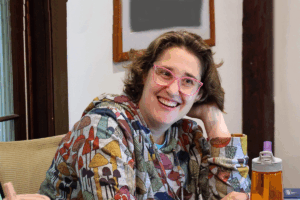Recently, Mountain Valley Treatment Center, along with our partners International OCD Foundation state affiliates from New Hampshire and Massachusetts, hosted the first Seacoast Anxiety Symposium in Portsmouth, NH. The Symposium was designed to share information about and facilitate a conversation on OCD and anxiety disorders. An impressive line-up of presenters and an expectation exceeding group of attendees made this inaugural event a huge success.
One of the presentations, delivered by Szu-Hui Lee, Ph.D. and Beth Ohr, Psy.D., focused on what effective anxiety treatment looks like across a continuum of care and within different settings. Dr. Lee is a psychologist at Phillips Exeter Academy, a private practice psychologist, and President of NH OCD. Dr. Ohr is a private practice psychologist and with the NH APA. Szu-Hui and Beth, who specialize in treating OCD and anxiety disorders, identified the essential elements of the CBT-based modality of Exposure and Response Prevention (ERP), the “gold standard” in treating debilitating anxiety and obsessive compulsive disorders, within an outpatient, residential and in-patient setting. Their presentation shared information to an audience of varied experience in Cognitive Behavioral Therapy about exposure therapy, the challenges of treatment and – most importantly – the full commitment of a therapist to properly treat it. They presented this information from a perspective of what a consumer should look for and ask of their therapist before engaging with them.
Beth and Szu-Hui referenced the article by Michael Jenike, M.D. ( https://iocdf.org/about-ocd/treatment/how-to-find-the-right-therapist) on the International OCD Foundation’s web site. Here is a summary of what Drs. Lee and Ohr shared and the specifics from Dr. Jenike’s article.
First of all, for a sufferer of life-interrupting anxiety and/or OCD, you deserve to get the right help and therefore you should take control of vetting a therapist. Ask questions. Dr. Jenike recommends specifically and at a minimum, these questions should be asked:
- “What techniques do you use to treat OCD?”
If the therapist is vague or does not mention cognitive behavioral therapy (CBT) or Exposure and Response Prevention (ERP), use caution. - “Do you use Exposure and Response Prevention to treat OCD?”
Be cautious of therapists who say they use CBT but won’t be more specific. - “What is your training and background in treating OCD?”
If they say they went to a CBT psychology graduate program or did a post-doctoral fellowship in CBT, it is a good sign. Another positive is if a therapist says they are a member of the International OCD Foundation (IOCDF) or the Association of Behavioral and Cognitive Therapists (ABCT). Also look for therapists who say they have attended specialized workshops or trainings offered by the IOCDF like the Behavior Therapy Training Institute (BTTI) or Annual OCD Conference. - “How much of your practice currently involves anxiety disorders?”
A good answer would be over 25%. - “Do you feel that you have been effective in your treatment of OCD?”
This should be an unqualified “Yes.” - “What is your attitude towards medication in the treatment of OCD?”
If they are negative about medication, this is a bad sign. While not for everyone, medication can be a very effective treatment for OCD. - “Are you willing to leave your office if needed to do behavior therapy?”
It is sometimes necessary to go out of the office to do effective ERP.
The last question regarding whether a therapist is willing to get out of their office to work with a client – to do exposures in real-life (in-vivo) settings – was highlighted and strongly reinforced by Beth and Szu-Hui. Exposure therapy cannot only occur in an office setting and within a 45 minute to one hour session. This treatment is difficult and requires not only a dedicated client, but a dedicated and properly trained clinician.
Don Vardell, Executive Director


